- Home
- Captain W E Johns
49 Biggles Cuts It Fine
49 Biggles Cuts It Fine Read online
MAINLY ABOUT ISLANDS
AIR-COMMODORE RAYMOND, Chief of the Air Section of Scotland Yard, greeted his operational staff from behind a paper-littered desk, as, in obedience to his invitation, they filed into his office.
"Pull up some chairs," he requested. "This is only in the nature of a conference, and, strangely enough, for once there's nothing urgent about it. Help yourselves to cigarettes—
we may be some time." He pushed the box forward.
Biggles clicked his lighter. "I thought things were too quiet to last,"
he murmured, a trifle cynically perhaps.
"If nothing more, I'll give you something to occupy your minds," promised the Air-Commodore. "The business I'm going to talk about is so far no more than a question mark
; but it's a biggish one, so I shall deal with it in two parts. In due course, you'll see how they fit together, in conjecture, if not in actual fact." He tapped the ash from his cigarette.
"First of all we're going to have a little chat about islands," he resumed. "I know quite a lot about them because I have spent the past week reading a mass of information compiled by the Security people from material provided by Admiralty Records. I shall ignore what we might call the popular or romantic angle. We are only concerned with an aspect which the ordinary
man in the street may not have taken into consideration, even today, when all sorts of remote scraps of land are apt to jump suddenly into the headlines. Nor shall I mention the larger islands that make up most of the world. It is the little odd specks in the ocean that are more likely to give us a headache. Some of these hitherto unconsidered trifles have suddenly become treasure islands, although not in the generally accepted sense of that term. They are treasures in the fact that they exist at all. I'll come back to that point presently." The Air-Commodore's eyes turned to Biggles.
"You should know as well as anyone that the desert islands that form the background of so much enchanting fiction are not dotted about the oceans merely in the imagination of the writers. They really exist ; and quite a lot of them are all that they are cracked up to be. Not all come into that category, however. The majority are anything but paradises on earth.
How many there are altogether I don't know. I doubt if anyone knows. But there are certainly more than most people suppose. There are, I learn with some astonishment, about ten thousand uninhabited islands in the Indian Ocean alone. There isn't room for all of them on the map. A single dot, under a single name, may represent an archipelago of hundreds of islands, some large but mostly small. There are so many that it has obviously been difficult to find names for all of them. There are islands named after animals, birds, fruit, the names of ships and the names of men who discovered them. There is an island for every saint in the calendar, every day of the week and every month of the year. The list is endless. Some occur in clusters of hundreds or even thousands. Some are lonely little lumps of land so far away from anywhere that they really
exist only on charts. No one ever sees them. No one ever goes near them.
There has never been a reason. Until recently they were utterly worthless. They were the orphans of the lonely wastes. Until now nobody had bothered about them. They were found, charted, and that was that. But because we happen to be a seafaring nation it was usually a wandering British ship, calling perhaps for fresh water, that planted the first flag ; for which reason a great many of them are our property.
"The old sailing skippers sometimes did more than plant the Union Jack.
Shipwreck was once more common than it is today, and with the ever present possibility of being cast away it was a common practice for ships' captains to put stores ashore and erect a notice to direct visitors to them. Survey ships of the Royal Navy did more. They planted fruit and vegetable seeds, and introduced hens, goats, sheep and rabbits, so that a shipwrecked mariner had something to eat while he was leading a Crusoe existence. In this way many a sailor's life has been saved, for there have been scores of castaways apart from such famous names as Alexander Selkirk, who, as you know, was the original Robinson Crusoe."
The Air-Commodore smiled apologetically. "You will see presently what this is leading up to."
"Now then," he went on. "Some of these islands have only been discovered within the last hundred years. Some haven't been visited for fifty years or more, not since the old-fashioned whalers sailed unfrequented seas looking for their quarry. In some cases, such as Dougherty Island for example, the island has completely disappeared. At all events, some cannot now be found. Others appear to play hide-and-seek ; here today and gone tomorrow. Thus with Falcon Island, which in 1885 was two hundred and ninety feet high. For years no one could find it. When it was rediscovered in 1927 it had shrunk to a hundred feet.
Tosca, in the Indian Ocean, blew up and is no more. Krakatoa did the same thing, with a bang that was heard for three thousand miles. My reason for mentioning this is simply to demonstrate the inadvisability of trusting too much to certain islands being where they are supposed to be."
" I'll bear it in mind," promised Biggles.
"Some islands are only a few feet above sea level at their highest point," continued the Air-Commodore. "Others tower up to many thousands of feet. Some have shores so precipitous that no one has yet set foot on them. Others are so exposed to gales that a landing is only possible once or twice a year. Penguin Island, one of the Crozet group, is a sheer rock sticking up for a thousand feet. At least one island was completely forgotten—Clipperton---in the Pacific. Mexico claimed it, put a garrison ashore, and then forgot all about it. When some years later a passing ship happened to call, the wretched people had all starved to death." The Air-Commodore drew a deep breath. "I tell you, it isn't until you really go into this island business that you realise what an amazing affair it is. Of course, I have a reason for going into it. Don't think I'm merely trying to entertain you."
"We had occasion to think on these lines before," put in Biggles. "It resulted in us going to Kerguelen."
"I remember," answered the Air-Commodore. "Kerguelen is a case in point.
There you have an island eighty miles long by forty-five miles wide and not a soul on it."
Biggles shrugged. "Only a lunatic would plant himself two thousand miles from his nearest neighbour."
"Don't be too sure about that," returned the Air-Commodore significantly.
"But let us proceed. Kerguelen isn't unique, except that it is larger than most uninhabited islands.
Heard Island, which is British, in the same lonely ocean, is twenty-five miles long by nine miles wide. Admittedly, there's a good reason for no one living there. The centre is an active volcano, six thousand feet high, with glaciers on its slopes. As far as we know, the last time the island was seen was in 1910, when the Wakefield passed close when she was looking for the survivors of the ill-fated Warratah. Even more unattractive is Saint Paul Island, where, if you dig, the ground begins to smoke. Both Saint Paul and Amsterdam Islands are the craters of nearly extinct volcanoes.
"For sheer loneliness, though, it would be hard to beat the Crozets, which lie more than sixteen hundred miles from the nearest land, which is the Cape of Good Hope. There are several of them, including twelve small ones known as the Apostles. It is in such islands as these that we now have a particular interest, for although they are in the world's loneliest sea, they happen to lie at no great distance from the Great Circle route between South Africa and Australia."
"You're thinking of mid-ocean refuelling stations for long distance air transport,"
guessed Biggles.
"Yes, and no," answered the Air-Commodore. "There's an aspect even more important than that one, which, as you know, arose a few years ago, and resulted in a ge
neral scramble for islands that happened to lie on projected inter-continental air routes.
Political complications
arose when several nations laid claims to the same islands. However, that was all buttoned up amicably, and at islands like Canton, which happened to have a lagoon that was a ready-made seaplane base, a policy of joint occupation was agreed upon. As a matter of detail I was thinking of that particular island, and others equally well placed, when I spoke just now of treasure islands. Lying near the great trans-ocean air routes of the future, they are worth far more than all the gold and jewels ever looted by pirates.
Take Swains Island. In 1856 a young man named Jennings settled there with his wife.
Now his descendants, forgotten for years, spring into the news. Another case was Rose Island. In 1870 it was bought for a pound. Today it isn't for sale at any price. Of course few islands are privately owned nowadays. But the point is, all these scraps of land scattered about the Seven Seas are now parcels of property worth having. Many are still remote, but communications like radio have telescoped the distance, as you might say."
"Nations that have none must be feeling the draught," observed Biggles.
"Exactly," said the Air-Commodore meaningly. "It is possible that some of them will try to use those that belong to other people—if they can do that without being spotted. The question arises, if in fact that is being done already, how are we going to spot them ? "
" Ah I "breathed Biggles. "Now I get it."
"That is the question that has brought us together this morning," stated the Air-Commodore.
I will now make a different approach to the same subject. It's the crux of the matter." He stubbed his cigarette.
"We know," he resumed, "no matter how we know, that there was established sometime ago behind the Iron Curtain a very special school in which emphasis was placed on certain specialised subjects, such as radar, radio, long-range projectiles and the like. It was evident from the high standard demanded of the pupils that they were destined for something more important than ordinary marine work. We were unable to find out what this was. We still don't know, but a recent development may have provided us with a pointer. At least, so think certain people whose job it is to work out these problems. Long range submarines have been putting to sea with these specially trained men on board, and sometimes coming back without them. Clearly, they have been put ashore somewhere.
Where, and for what purpose, we would very much like to know. It seems unlikely that they have been taken to any continental mainland, or the more populous islands, for they could hardly hope to remain there for any length of time without their presence being discovered. It seems possible, if not probable, that they have been put where, in the event of war, they would be able to strike with telling effect across our lines of communication, against troop transports, for instance, from unsuspected hide-outs. Not only from unsuspected hide-outs but from unsinkable ones.
Obviously, they would be able to do immense damage, and so disorganise the carefully prepared plans of the Western Powers.
Moreover, bearing in mind the precipitous nature of certain islands, as I went to some pains to explain just now, it might be extremely difficult to dislodge a hostile force so placed.
"It's an alarming thought, but there's no getting away from it. A mere handful of men on, say, Marion Island, which is British, and rises sheer four thousand feet out of the sea, or Prince Edward Island, which has a fifteen mile coast of black perpendicular cliff, could make the place an impregnable fortress. These islands, and other similar ones, are all uncomfortably close to our main lines of communication. And remember, all these I have mentioned are in one section of the globe. I'm not suggesting that aircraft could operate from all these places, but we are living in an age of weird and wonderful missiles."
"It doesn't need much room to catapult an aircraft," said Biggles thoughtfully. "And a machine needn't necessarily return to its base.
Having done its work it could make for the nearest mainland."
"Just so. Nor does it need much room to operate a radar or radio station in contact with prowling long-range submarines." The Air-Commodore sat back and put his fingers together. "You see the size of the proposition with which we're faced."
"So far I don't think you've mentioned an actual proposition," said Biggles evenly.
"Obviously, those responsible for the defence of the Western Union are not likely to sleep comfortably in their beds while this potential threat is hanging over them. They want to satisfy themselves that their fears are groundless—or otherwise."
"What you mean is, it is proposed to search these islands to see if any unwelcome tenants have taken up residence."
"Yes. We daren't just let the matter slide and hope for the best. Once trouble started, which heaven forbid, it would be too late to do anything."
"But this, surely, is a job for the Jolly Jack Tars," said Biggles.
"It would be if the Navy had a few hundred more ships and could spare them for such a purpose. Think of the time that would be required.
Even with a big fleet it would take years to examine every island on the danger list."
"It would take aircraft some time, too, if that's the bright idea,"
declared Biggles.
"Aircraft are still a lot faster than the fastest marine craft capable of undertaking such a job. It isn't suggested that aircraft reconnoitre every island in every ocean," explained the Air-Commodore quickly. "That would be almost impossible. A suggestion was put forward that, in the first place, the islands most strategically placed should be given the once over. By which I mean those most likely to be of use to a potential enemy, such as the islands in the South Indian Ocean that I've mentioned.
If these yielded nothing of a suspicious nature it would at least allay anxiety and give reason to hope that our fears were groundless. On the other hand, if something sinister was discovered on one of the islands, every available ship and aircraft would have to embark on the major operation of checking up on the rest ; for if one enemy base was established we should have to assume that there were others. In other words, at this juncture we are proposing no more than a preliminary survey, concentrating on those islands that are, I admit, the most remote, and for that reason most likely to be fortified secretly by our enemies."
"Tell me this," requested Biggles. "What do the people behind this scheme think that an aircraft can do ? They're not expecting anyone to land on a glacier, an active volcano, or even a lump of rock thousands of miles from anywhere—I hope ? "
" No."
"Then what, apart from speed, is the advantage of an aircraft over a ship
? "
"This," countered the Air-Commodore. "A ship approaching an enemy base such as we visualise would be seen a long way off, thus giving the garrison plenty of time to cover everything up. You may be sure that protective camouflage would be available. On the other hand, an aircraft arriving suddenly and unexpectedly might catch them on one foot, so to speak. One wouldn't expect to see a gun emplacement or anything of that nature, but there might be other signs, such as the smoke of a cooking fire, for example. A further argument is, a ship can only see one section of land at a time, and that from ground level.
An aircraft, flying high, has a comprehensive view of the whole thing. It can take and bring back photographic records to be studied at leisure by experts who are up to all the tricks of camouflage. None of these islands has ever been photographed from the air. It's time they were. In fact, I doubt if an aircraft has ever been within sight of them."
Biggles took a cigarette and tapped it thoughtfully on the table. "This looks like being the biggest game of hunt-the-thimble so far devised by a world that is fast going round the bend," he remarked.
"Can you think of an alternative ? "
"Neither can anyone else, for the simple reason that there isn't one."
"I agree with every word you say," assented Biggles. "It doesn't need much imagination to see the ri
sks these islands represent. Tell me, is there any actual evidence to support these suspicions ? "
"Not a thing, apart from the training of these mystery men who are obviously being put ashore somewhere. We are fortunate in a way that none of the Iron Curtain countries possess islands in a position to worry us.
The Western Powers own practically all of them, so the question of territorial rights doesn't arise."
Biggles smiled mirthlessly. " A fat lot of difference that would make if one happened to bump into an enemy force on our property, or an island belonging to any of the Western Powers. It would be a case of dead men tell no tales."
"Well, that's the position," stated the Air-Commodore with an air of resignation. "The situation as I have described it has been sprung on us out of the blue. Perhaps we are to blame for not taking steps earlier to safeguard our property ; but with Korea, Malaya, Africa and the rest, we have enough on our plate without maintaining military units on every scrap of land between the North Pole and the South."
Biggles nodded. "True enough. Well, what do you want me to do ? "
"There's no particular hurry about anything. It struck me that while things are quiet you might have a look round and check up on some of these odd scraps of land likely to be more of a curse than a blessing.
Handle the thing your own way. The Admiralty are willing to base a frigate here and there in case there was trouble of any sort."
"That's kind of them, considering what we're doing is really their job,"
answered Biggles sarcastically, getting up and walking over to the big map of the world that covered one wall of the office.
"I gather you're not keen on the job ? "
"You wouldn't expect any man in his right mind to be wildly enthusiastic at the idea of flying over thousands
of miles of salt water with no rescue service available. There's still such a thing as structural failure and even the best engines do occasionally pack up."
"You should be able to organise a rescue service of your own. You've done it before."
"I know, but that doesn't mean I take kindly to the idea of wagering somebody else's life, apart from my own, against a piece of machinery functioning properly for umpteen hours on end. I like to have something solid within striking distance. Incidentally, I notice several of these islands—the Crozets for instance—are French."

 Biggles in the Underworld
Biggles in the Underworld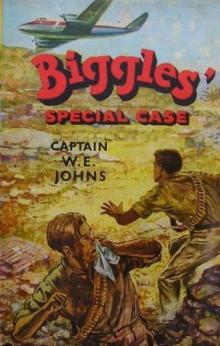 Biggles' Special Case
Biggles' Special Case 34 Biggles Hunts Big Game
34 Biggles Hunts Big Game 03 Now To The Stars
03 Now To The Stars 55 No Rest For Biggles
55 No Rest For Biggles 46 Biggles in the Gobi
46 Biggles in the Gobi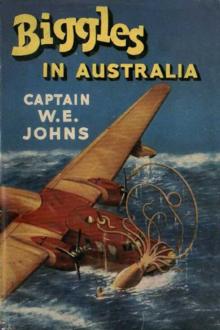 52 Biggles In Australia
52 Biggles In Australia 51 Biggles Pioneer Air Fighter
51 Biggles Pioneer Air Fighter 05 Biggles Flies East
05 Biggles Flies East 28 Biggles In Borneo
28 Biggles In Borneo 29 Biggles Fails to Return
29 Biggles Fails to Return 55 No Rest For Biggles (v2)
55 No Rest For Biggles (v2) Biggles Does Some Homework
Biggles Does Some Homework Biggles of the Camel Squadron
Biggles of the Camel Squadron 35 Biggles Takes A Holiday
35 Biggles Takes A Holiday Biggles And The Black Peril (06)
Biggles And The Black Peril (06) 17 Biggles And The Rescue Flight
17 Biggles And The Rescue Flight Biggles Learns To Fly
Biggles Learns To Fly 40 Biggles Works It Out
40 Biggles Works It Out 05 Biggles Learns To Fly
05 Biggles Learns To Fly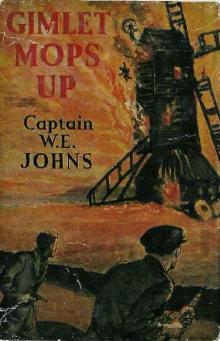 04 Gimlet Mops Up
04 Gimlet Mops Up 10 Biggles and Co
10 Biggles and Co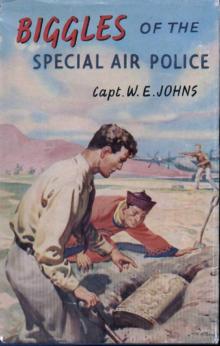 47 Biggles Of The Special Air Police
47 Biggles Of The Special Air Police Biggles and the Noble Lord
Biggles and the Noble Lord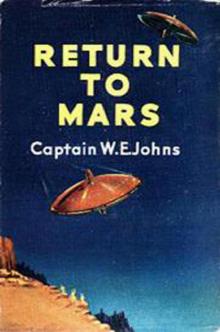 T2 Return To Mars
T2 Return To Mars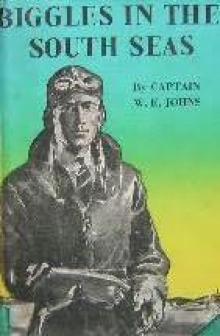 21 Biggles In the South Seas
21 Biggles In the South Seas No Rest For Biggles
No Rest For Biggles Biggles In The Cruise Of The Condor (02)
Biggles In The Cruise Of The Condor (02) 06 Biggles And The Black Peril
06 Biggles And The Black Peril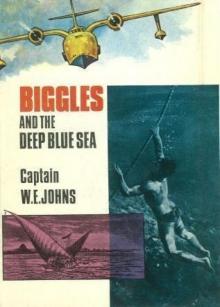 Biggles and the Deep Blue Sea
Biggles and the Deep Blue Sea 06 Biggles Hits The Trail
06 Biggles Hits The Trail 39 Biggles Goes To School
39 Biggles Goes To School 44 Biggles and the Black Raider
44 Biggles and the Black Raider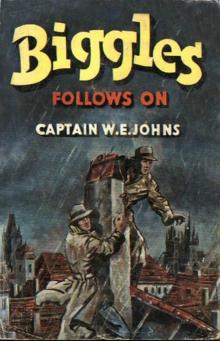 42 Biggles Follows On
42 Biggles Follows On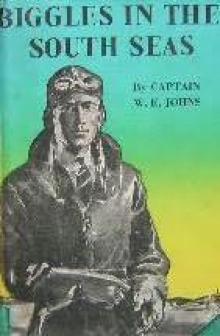 Biggles In the South Seas
Biggles In the South Seas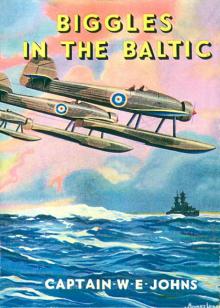 21 Biggles In The Baltic v3
21 Biggles In The Baltic v3 27 Biggles - Charter Pilot
27 Biggles - Charter Pilot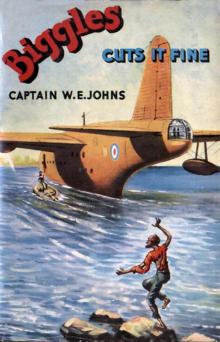 49 Biggles Cuts It Fine
49 Biggles Cuts It Fine 51 Biggles Foreign Legionaire
51 Biggles Foreign Legionaire 04 Biggles Flies Again
04 Biggles Flies Again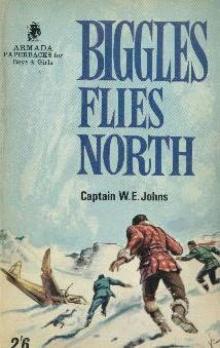 16 Biggles Flies North
16 Biggles Flies North 37 Biggles Gets His Men
37 Biggles Gets His Men 07 Gimlet Bores In
07 Gimlet Bores In 19 Biggles Secret Agent
19 Biggles Secret Agent 32 Biggles In The Orient
32 Biggles In The Orient Adventure Unlimited
Adventure Unlimited 26 Biggles Sweeps The Desert
26 Biggles Sweeps The Desert Biggles Air Detective (43)
Biggles Air Detective (43) 36 Biggles Breaks The Silence
36 Biggles Breaks The Silence 14 Biggles Goes To War
14 Biggles Goes To War 18 Biggles In Spain
18 Biggles In Spain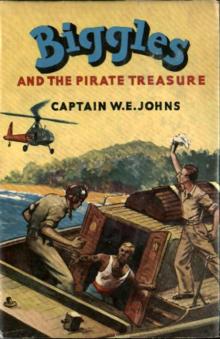 50 Biggles and the Pirate Treasure
50 Biggles and the Pirate Treasure 25 Biggles In The Jungle
25 Biggles In The Jungle 23 Biggles Sees It Through
23 Biggles Sees It Through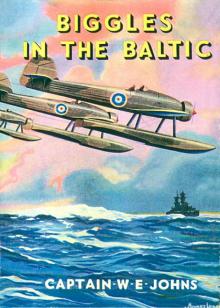 21 Biggles In The Baltic
21 Biggles In The Baltic 24 Spitfire Parade
24 Spitfire Parade 38 Another Job For Biggles
38 Another Job For Biggles 41 Biggles Takes The Case
41 Biggles Takes The Case 43 Biggles Air Detective
43 Biggles Air Detective 53 Biggles Chinese Puzzle
53 Biggles Chinese Puzzle Biggles Pioneer Air Fighter (51)
Biggles Pioneer Air Fighter (51) 22 Biggles Defies The Swastika
22 Biggles Defies The Swastika 01 Kings Of Space
01 Kings Of Space